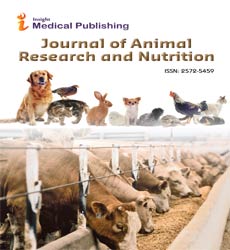Abstract
Dietary Sources and Their Effects on Animal Production and Environmental Sustainability
Animal agribusiness has been a significant part in the coordinated cultivating frameworks in agricultural nations. It serves in a central enhanced job in creating animal protein food, draft influence, ranch excrement just as guaranteeing societal position quo and advancing business. Ruminants are critically contributable to the prosperity and the business of the worldwide populace. . Ruminant creation frameworks can shift from means to concentrated kind of cultivating relying upon territory, asset accessibility, foundation availability, food interest and market possibilities. The developing interest for practical creature creation is convincing to specialists investigating the expected ways to deal with diminish ozone depleting substances (GHG) emanations from domesticated animals.
An Earth-wide temperature boost has been an issue of concern and significance for all particularly those occupied with creature horticulture. Methane (CH4) is one of the major GHG represented at any rate 14% of the absolute GHG with an Earthwide temperature boost expected 25-overlay of carbon dioxide and a 12-year air lifetime. Farming area has a commitment of 50 to 60% methane outflow and ruminants are the significant wellspring of methane commitment (15 to 33%). Methane outflow by enteric aging of ruminants addresses a deficiency of energy consumption (5 to 15% of aggregate) and is delivered by methanogens (archaic) because of aging finished results. Ruminantsó stomach related maturation brings about aging finished results of unpredictable unsaturated fats (VFA), microbial protein and methane creation in the rumen. Rumen microorganisms including microbes, protozoa and parasitic zoospores are firmly connected with the rumen aging effectiveness. . Other than utilizing feed definition and taking care of the board, nearby feed assets have been utilized as elective feed added substances for control of rumen environment with promising outcomes for substitution in ruminant taking care of. Those potential feed added substance rehearses are as per the following:
1) the utilization of plant concentrates or plants containing optionalmixtures (e.g., dense tannins and sapiens, for example, mangos teen strip powder, downpour tree unit;
2) plants plentiful in minerals, e.g., banana bloom powder; and
3) plant fundamental oils, e.g., garlic, eucalyptus leaf powder, and so on Execution of the - feed- framework utilizing money crop and leguminous bushes or feed trees are of promising outcomes.
Author(s):
Nikita Choudary
Abstract | Full-Text | PDF
Share this

Google scholar citation report
Citations : 764
Journal of Animal Research and Nutrition received 764 citations as per google scholar report
Abstracted/Indexed in
- Google Scholar
- China National Knowledge Infrastructure (CNKI)
- WorldCat
- International Committee of Medical Journal Editors (ICMJE)
- Secret Search Engine Labs
Open Access Journals
- Aquaculture & Veterinary Science
- Chemistry & Chemical Sciences
- Clinical Sciences
- Engineering
- General Science
- Genetics & Molecular Biology
- Health Care & Nursing
- Immunology & Microbiology
- Materials Science
- Mathematics & Physics
- Medical Sciences
- Neurology & Psychiatry
- Oncology & Cancer Science
- Pharmaceutical Sciences

